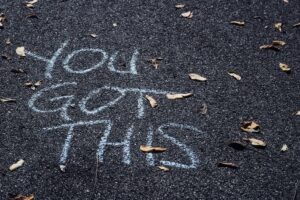Realities of the Transition from Student to PR Practitioner
Published on March 29, 2023, at 5:30 p.m.
by Morgan Perkins.
Recent college graduates struggling with imposter syndrome are not alone. The transition from being a student to working in the public relations industry can cause challenges for even the most prepared students entering the field. Luckily, the difficulties of the transition typically do not last throughout the entirety of one’s career.

Immediate questions
Sarah Dougherty, account director and content specialist at The Bliss Group, explained her transition from being a public relations student to working full time in the industry.
“The public relations industry was partially what I expected based on internships and what I had heard from people in entry-level agency roles,” Dougherty said. “However, I also did not even imagine the dynamics that I was going to be navigating [throughout the transition].”
The transition looks and feels different for everyone. Dougherty graduated less than six years ago from The University of Alabama, and she shared how she underestimated the role data and reporting would have on her daily activities in her early years, especially with pitching to reporters. Throughout the transitional phase, many recent graduates find the adjustments and changes exhausting. Dougherty discussed how the agency environment is fast-paced and there is a lot to learn all at once, so by the end of the week she would be in need of a “reset.”
Maret Montanari, public relations specialist at Jackson Spalding, said the transition was especially hard in terms of the schedule change.
“I had a bit more freedom and flexibility in college compared to going into the industry full time. If a client asks you for something, you must deliver on their timeline,” Montanari said.
Montanari explained how there was a learning curve during her transition. She needed time to adjust to how an agency operated in terms of expectations and responsibilities.
“The transition throws you into an environment where you don’t know everything anymore,” Montanari said. Nonetheless, she did note that her confidence increased being in real-world situations and applying skills she refined for four years in college, even though the transition was humbling.
According to Agility PR Solutions, the public relations industry is rapidly growing and becoming more competitive with an estimated 11% increase in employment from 2020 to 2023. There is added pressure after graduating college with this heightened stress and uncertainty, Agility PR Solutions commented.
Hudson Nuckolls, social media account executive at GS&F, admitted, “I did not think about the job search in a healthy way. I don’t know if a lot of people do.” He then reflected on his experiences when applying for jobs and explained how through hindsight bias everything has a way of working itself out.
Internal challenges
The transition after graduating poses many challenges individuals must overcome internally to have a successful career in the public relations industry. Those challenges include self-doubt and starting over at the bottom of the totem pole.
Nuckolls shared how he was self-conscious about his lack of execution skills and felt he acquired more general skills during his time at The University of Alabama. When he was finally able to trust his instincts, he learned his prior experiences were more relevant than he originally thought. “I developed skills I did not even pick up on until I put them to use at GS&F,” Nuckolls said.

A transitional challenge Dougherty faced was executing more administrative work and managing up. During her senior year in college, she felt she was able to run the show in campus organizations and make most of the decisions. Whereas when she entered the industry full time, Dougherty was not on a client-facing call for a few months and had to begin at square one. Dougherty understood that she had a lot to learn entering the industry; however, the adjustment mentally felt like a step backward.
Molly Leahy, associate public relations director at Walker Sands, discussed her unique transition from being a journalism student to working in the PR industry.
“I remember having a lot of imposter syndrome because I found it to be very different from school personally,” Leahy said.
Leahy interned with Walker Sands the summer before her senior year of college and received a full-time job offer during her spring semester senior year. However, Leahy went nine months without writing a press release or pitch because of her journalism major. She then was quickly thrust back into the public relations industry and writing pitches every day.
As a result, Leahy attributed her gap in experience as the cause of her imposter syndrome in the first few months. “I had high expectations to perform well. I think I put too much pressure on myself because it was so different from journalism. I transparently did not have a lot of PR experience before I started,” Leahy noted.
However, Leahy shared how her journalism background strengthened her abilities to build relationships with reporters and understand what makes an impactful story.
Solutions to increase success
There are ways to ease into the transition and prevent excessive feelings of imposter syndrome. Leahy explained how when she first started her job, she wanted to make a good impression and never took any PTO within the first six months. However, she elaborated that the transitional period was the first time she did not have anything pre-planned on her social calendar compared to how she did in college.

“Suddenly, you’re just working with no end in sight and nothing on the horizon to look forward to,” Leahy said.
She advised that when you start to feel burnt out, schedule a personal day to motivate yourself to work better. Otherwise, it is an endless cycle of work, Leahy noted.
Another way to ease into the transition is to refine tangible and intangible skills before entering the industry. According to a study by The National Center for Biotechnology, writing, strategy, verbal communication, media relations and social media are the most requested skills by employers. Focusing on these skills while in college can allow recent graduates to feel more confident in their abilities when starting their first job.
Nuckolls also emphasized that part of having a successful transition is learning how to self-advocate. “Even if you have a great culture and people genuinely care about each other, nobody has the time to think about your growth and success the same way you do. You are the only person fully aware of what you are doing and what you need,” Nuckolls said. He suggested writing down all your contributions to projects to best express your value.
Peaks and valleys

While there are many difficult adjustments during the transition, the public relations industry does not disappoint, according to Montanari. The industry exceeded her expectations and allowed her to learn about contrasting industries while becoming an expert at her craft, she said.
Montanari recounted how nervous she was entering the industry, but the day before she started her first job, she found an old note from a professor with advice that “comfort and growth cannot coexist.” This advice silenced the voice in the back of her head doubting her capabilities and potential.
“Finding the note felt like a sign to embrace the unknown and lean into the fact that I was probably going to be taken down a few competence pegs going out into the real world,” Montanari said. “You are not going to nail every assignment, and you are most likely going to receive red lines back on your deliverables. The important part of the transition is to give yourself grace.”




